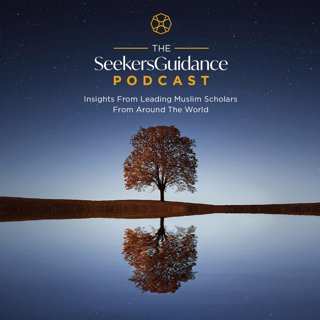
Reciting the Quran as it Deserves to be Recited- Shaykh Faraz Rabbani
Shaykh Faraz explains what it means to "recite the Quran as it deserves to be recited". He tells us that the the Arabic word of reciting, tilawa, means to follow. He explains that one meaning is that the reciter recites one verse followed by another. Another meaning is that the actions and states the Quran calls to, follows the recitation of the Quran. Checkout all of the SeekersGuidance podcasts by visiting https://seekersguidance.org/podcasts/ Help Seekersguidance build a Global Islamic Seminary and spread the light of guidance to millions around the world by supporting us through monthly donation by going to https://seekersguidance.org/donate – your donations are tax deductible in the US and Canada.
3 Jan 20183min

The Urgent Priorities for Muslims in the West – Shaykh Yahya Rhodus
In this critical and timely talk, Shaykh Yahya Rhodus emphasizes and highlights the urgency of the preservation and dissemination of knowledge, which is the Prophetic inheritance. He continues to explain that Imam al-Ghazali highlighted three principles in his magnum opus, Ihya Ulum al-Din (Revival of the Religious Sciences), that are meant to bring about renewal of faith in people: knowledge, devotion and service. According to Shaykh Yahya, establishing SeekersHub and other institutions of Islamic knowledge is the most important obligation of this time and fulfills these principles. “Learning the sciences of the Sacred Law, with an unbroken chain in the established traditional way, while utilizing the beneficial modern methods and ways of instruction and making it relevant to the times we live in, in order to facilitate practice.” He expresses that this is what he sees when he looks at SeekersHub, and that no one should underestimate their potential in bringing this matter to fruition. He explains that realizing this potential is through seeking great matters from Allah, through His Greatness. Subscribe to Shaykh Yahya Rhodus' podcast, or any of our other podcasts by visiting https://seekersguidance.org/podcasts. Register to any of our classes either online or in-person in Toronto. All classes are free. Visit https://seekersguidance.org. Help Seekershub build a Global Islamic Seminary and spread the light of guidance to millions around the world by supporting us through monthly donation by going to https://seekersguidance.org/donate - your donations are tax deductible in the US and Canada.
3 Jan 201833min

Tribulations from a Faith Perspective – Shaykh Yahya Rhodus
Shaykh Yahya highlights that the greatest gift that we have been given, is the gift of faith because enables us to live a life of purpose. Faith is also the greatest gift we can give to the modern world in which we live. As people move further and further away from belief, resulting in a state of agitation and a state of panic. Faith (iman) is related to security (amn). With faith one finds security in their Lord who absolutely sustains and takes care of everything from its beginning to its fruition. Shaykh Yahya reminds us that history is in good hands. The umma of the Prophet (peace and blessings be upon him) is granted mercy. There are many things of this deen and in this world that one cannot fully understand or comprehend the wisdom of, until they take into consideration the afterlife, and see how it plays out in the next life. Checkout all of the SeekersHub podcasts by visiting https://seekersguidance.org/podcasts/
28 Dec 201723min

The Gift and the Response: Gratitude for the Prophet Muhammmad ﷺ and How to Express It – Shaykh Faraz Rabbani
In this Friday khutba, Shaykh Faraz Rabbani calls the believers to reflect on the great favor sent by Allah Most High, the messenger of Allah, Prophet Muhammad (peace and blessing be upon him). Shaykh Faraz goes on to remind us all to renew our gratitude during this month of Rabi al-Awwal, and be grateful for the Divine Mercy of Allah of sending us the Messenger of Allah (peace and blessing be upon him). He provides key advice on how we can express this gratitude by connecting to the guidance of Prophet Muhammad (peace and blessings be upon him). Shaykh Faraz explains in this khutba that both faith and righteous deeds entail following the Messenger of Allah (peace and blessing upon him). Surat al-Asr (chapter 103 in the Qur'an) encapsulates how the believers should be. Be thankful of both the Messenger of Allah (peace and blessing upon him), and the message that he came with. He ends the khutba by reminding all to send peace and blessings on the Prophet Muhammad (peace and blessing be upon him). This Friday sermon was delivered in November of 2017 at the International Muslims Organization of Toronto (IMO) (http://imooftoronto.com/). Checkout all of the SeekersGuidance podcasts by visiting https://seekersguidance.org/podcasts/
27 Nov 201741min

The Reality of Repentance – Shaykh Faid Mohammed Said
In this podcast Shaykh Faid Mohammed Said calls the believers to realize the reality of repentance, it is not simply repenting and turning to Allah when one sins. But it is to be suspect of one’s repentance. He goes on to mention some secrets of repentance. The one constantly making repentance will make excuses for others as well. Shaykh Faid also gave a prior talk on the Importance of Repentance found on our SeekersHub Podcast here: https://seekersguidance.org/podcasts/2017/11/12/importance-repentance-shaykh-faid-mohammed-said/ Shaykh Faid Mohammed Said is the resident scholar at the Larayb Institute For Education, in the UK. Checkout all of the SeekersHub podcasts by visiting https://seekersguidance.org/podcasts/.
23 Nov 201720min

The Importance of Repentance – Shaykh Faid Mohammed Said
In this podcast Shaykh Faid Mohammed Said calls the believers to realize the real wrongdoing, is in not repenting and turning to Allah when one errs. He also defines what repentance is. Shaykh Faid goes on to emphasize that Allah is always watching, and that we should be heedful of that. He also explains the state of those who do not make repentance, and how their lack of repentance is a turning away from Allah Most High. Conversely, repentance is one of the key traits of the believers. Shaykh Faid Mohammed Said is the resident scholar at the Larayb Institute For Education, in the UK. Checkout all of the SeekersGuidance podcasts by visiting https://seekersguidance.org/podcasts/.
12 Nov 201740min

The High Rank of Sayyida Khadija – Shaykh Faid Mohammed Said
In this podcast, Shaykh Faid Mohammed Said explains the blessings of the high rank of Sayyida Khadija, and how she reassured the Prophet Muhammad (peace and blessing be upon him). Shaykh Faid goes onto to explain how Sayyida Khadija was blessed with a number of first. She w as the first to believe, the first to do wudu, and the first to pray. Allah the Most High blessed Sayyida Khadija with a house in paradise and give her sallams. Shaykh Faid closes by calling the believers whether male or female to learn about the high rank of Sayyida Khadija. This talk took place at the Harrow mosque in the U.K. Larayb Institute for Education Checkout all of the SeekersGuidance podcasts by visiting https://seekersguidance.org/podcasts/.
29 Okt 201718min

Nights of Reflection and Light – The Sunna of Reciting the Closing Ten Verses of Surat Aal-Imran- Shaykh Faraz Rabbani
Shaykh Faraz Rabbani explains the closing ten verses of Surat Aal-Imran (3.190-200):Indeed, in the creation of the heavens and the earth and the alternation of he day and night there are signs for people of reason,˹They are those who remember Allah while standing, sitting, and lying on their sides, and reflect on the creation of the heavens and the earth ˹and pray˺, “Our Lord! You have not created ˹all of˺ this without purpose. Glory be to You! Protect us from the torment of the Fire. Our Lord! Indeed, those You commit to the Fire will be ˹completely˺ disgraced! And the wrongdoers will have no helpers. Our Lord! We have heard the caller to ˹true˺ belief, ˹proclaiming,˺ ‘Believe in your Lord ˹alone˺,’ so we believed. Our Lord! Forgive our sins, absolve us of our misdeeds, and allow us ˹each˺ to die as one of the virtuous Our Lord! Grant us what You have promised us through Your messengers and do not put us to shame on Judgment Day—for certainly You never fail in Your promise.”So their Lord responded to them: “I will never deny any of you—male or female—the reward of your deeds. Both are equal in reward. Those who migrated or were expelled from their homes, and were persecuted for My sake and fought and ˹some˺ were martyred—I will certainly forgive their sins and admit them into Gardens under which rivers flow, as a reward from Allah. And with Allah is the finest reward!”Do not be deceived by the prosperity of the disbelievers throughout the land. It is only a brief enjoyment. Then Hell will be their home—what an evil place to rest! But those who are mindful of their Lord will be in Gardens under which rivers flow, to stay there forever—as an accommodation from Allah. And what is with Allah is best for the virtuous.Indeed, there are some among the People of the Book who truly believe in Allah and what has been revealed to you ˹believers˺ and what was revealed to them. They humble themselves before Allah—never trading Allah’s revelations for a fleeting gain. Their reward is with their Lord. Surely Allah is swift in reckoning. O believers! Patiently endure, persevere stand on guard, and be mindful of Allah, so you may be successful. (translation from Clear Qur’an by Dr. Mustafa Khattab, taken from Quran.com) In which the Messenger of Allah (peace & blessings be upon him) regularly recited when he got up for night worship. These verses affirm the importance of Reflection and Remembrance (fikr and dhikr) as the means for certitude (yaqin) and true, living, transformative faith (Iman). And they close with a memorable verse calling believers to patience, steadfastness, fortitude, and mindfulness as keys to eternal success. Khutba from Jamiat-ul-Ansar (www.jamiatulansar.ca/) in Brampton. Checkout all of the SeekersHub podcasts by visiting https://seekersguidance.org/podcasts/.
25 Okt 201734min





















